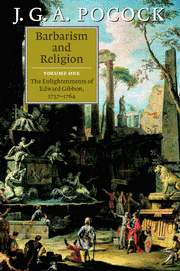Book contents
- Frontmatter
- Contents
- Acknowledgements
- Note on references, quotations and translations
- List of abbreviations
- Introduction
- PART I ENGLAND AND SWITZERLAND, 1737–1763
- 1 Putney, Oxford and the question of English Enlightenment
- 2 Lausanne and the Arminian Enlightenment
- 3 The re-education of young Gibbon: method, unbelief and the turn towards history
- 4 The Hampshire militia and the problems of modernity
- 5 Study in the camp: erudition and the search for a narrative
- PART II THE ENCOUNTER WITH PARIS AND THE DEFENCE OF ERUDITION, 1761–1763
- PART III LAUSANNE AND ROME: THE JOURNEY TOWARDS A SUBJECT, 1763–1764
- Epilogue: Gibbon and the rhythm that was different
- List of references
- Index
3 - The re-education of young Gibbon: method, unbelief and the turn towards history
Published online by Cambridge University Press: 15 December 2009
- Frontmatter
- Contents
- Acknowledgements
- Note on references, quotations and translations
- List of abbreviations
- Introduction
- PART I ENGLAND AND SWITZERLAND, 1737–1763
- 1 Putney, Oxford and the question of English Enlightenment
- 2 Lausanne and the Arminian Enlightenment
- 3 The re-education of young Gibbon: method, unbelief and the turn towards history
- 4 The Hampshire militia and the problems of modernity
- 5 Study in the camp: erudition and the search for a narrative
- PART II THE ENCOUNTER WITH PARIS AND THE DEFENCE OF ERUDITION, 1761–1763
- PART III LAUSANNE AND ROME: THE JOURNEY TOWARDS A SUBJECT, 1763–1764
- Epilogue: Gibbon and the rhythm that was different
- List of references
- Index
Summary
Early in the five years Gibbon spent at Lausanne, he was restored to Protestantism, and there is the question of what part the Swiss experience generally played in his movement away first from orthodox, and then from any, Christian belief. He also resumed under tutorial direction, the progress of his studies, venturing into classical scholarship both ancient and modern. There was nothing un-Christian in such studies, yet once the step away from authority had been taken, erudition might become philosophe and substitute itself for theology and sacred history; and we have set up a framework through which it was possible to proceed from Arminian and Remonstrant learning to critical scepticism and a choice between fideist submission and further rejections of belief. In this progress, once embarked upon, erudition might play a part; and we desire to know whether, or how far, Gibbon followed such paths during his Lausanne years. Here we are confronted by the account given in his Memoirs, and by the problem of what evidence there may be to confirm them or to support other answers to our question; and we remind ourselves that if such evidence is lacking, the Memoirs tell us how Gibbon remembered, or chose to present, his early experience, and we can consider only the consequences of accepting or rejecting such interpretations.
His formal restoration to Protestant communion occurred on Christmas Day 1754, some eighteen months after he arrived in Lausanne.
- Type
- Chapter
- Information
- Barbarism and Religion , pp. 72 - 93Publisher: Cambridge University PressPrint publication year: 1999



